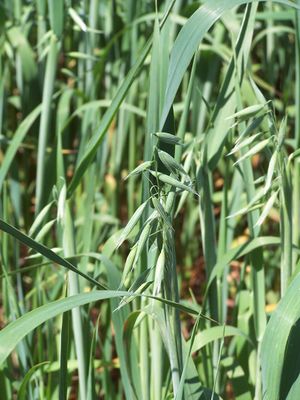Note: This is a project under development. The articles on this wiki are just being initiated and broadly incomplete. You can Help creating new pages.
Avena sativa - Oat
The oat[1] (Avena sativa), sometimes called the common oat, is a species of cereal grain grown for its seed, which is known by the same name (usually in the plural, unlike other cereals and pseudocereals). While oats are suitable for human consumption as oatmeal and rolled oats, one of the most common uses is as livestock feed.
- Nutrient profile
Oats are generally considered healthy due to their rich content of several essential nutrients (table). In a 100 gram serving, oats provide 389 calories and are an excellent source (20% or more of the Daily Value, DV) of protein (34% DV), dietary fiber (44% DV), several B vitamins and numerous dietary minerals, especially manganese (233% DV) (table). Oats are 66% carbohydrates, including 11% dietary fiber and 4% beta-glucans, 7% fat and 17% protein (table). The established property of their cholesterol-lowering effects has led to acceptance of oats as a health food
- Soluble fiber
Oat bran is the outer casing of the oat. Its daily consumption over weeks lowers LDL ("bad") and total cholesterol, possibly reducing the risk of heart disease. One type of soluble fiber, beta-glucans, has been proven to lower cholesterol.
- Fat
Oats, after corn (maize), have the highest lipid content of any cereal, e.g., greater than 10% for oats and as high as 17% for some maize cultivars compared to about 2–3% for wheat and most other cereals.[citation needed] The polar lipid content of oats (about 8–17% glycolipid and 10–20% phospholipid or a total of about 33%) is greater than that of other cereals, since much of the lipid fraction is contained within the endosperm
- Protein
Oats are the only cereal containing a globulin or legume-like protein, avenalin, as the major (80%) storage protein.Globulins are characterised by solubility in dilute saline as opposed to the more typical cereal proteins, such as gluten and zein, the prolamines (prolamins). The minor protein of oat is a prolamine, avenin.
Oat protein is nearly equivalent in quality to soy protein, which World Health Organization research has shown to be equal to meat, milk and egg protein.The protein content of the hull-less oat kernel (groat) ranges from 12 to 24%, the highest among cereals.
Common name
- Hindi - जौ
